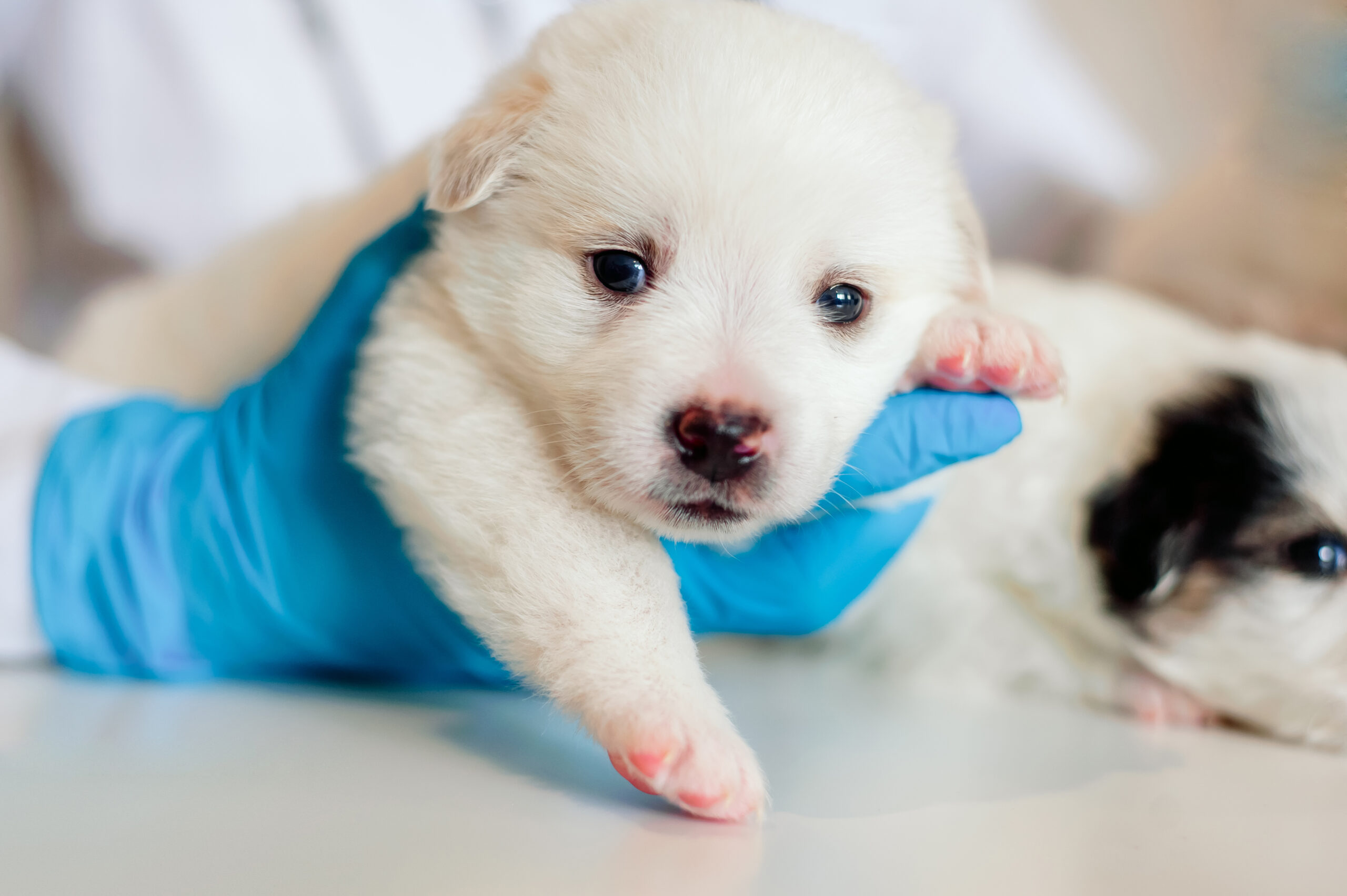If you have a dog, then you likely have had a discussion with your veterinarian about the dangers of parvovirus. Parvovirus is a serious viral disease in dogs, causing bloody stool, vomiting, and is often fatal without treatment. It is also a highly contagious infectious disease. Fortunately, there is a vaccine available. This article will give pet owners everything they need to know about the parvovirus vaccine for dogs.
What is Canine parvovirus?
Canine parvovirus (CPV), often referred to as parvo, is a viral infection seen in dogs that is almost 100% fatal without veterinary treatment. Canine parvovirus attacks the gastrointestinal tract, immune system (bone marrow), and heart. While dogs of any age can become infected with parvovirus, puppies, and dogs that stay in kennels, visit dog parks, or are in shelters are at higher risk of developing sickness due to parvovirus. In addition, certain breeds, such as Rottweilers, are at higher risk of parvovirus.
Dogs are typically infected with Parvovirus by sniffing, eating, or licking soil, items, or hard surfaces that have been contaminated by feces from an infected dog. Parvovirus is very hardy, tough to destroy, and can persist in the environment for a long time. Clinical signs of parvovirus include:
- Severe diarrhea, often bloody
- Severe vomiting
- Loss of appetite
- Collapse
- Abdominal pain
- Dehydration
- Sudden death
What is the parvo vaccine, and how does it work?
The parvovirus vaccine is a modified live vaccine. Modified live vaccines help dogs build immunity by exposing them to a small amount of an inactivated (weakened) version of the virus that teaches a dog’s immune system how to fight off the infection without actually making them sick with the disease. Once a modified live vaccine is administered, the virus replicates within the dog’s system, creating an opportunity for the immune system to mount a response by creating antibodies.
Modified live vaccines typically come in freeze-dried powder form that must be reconstituted with a liquid that is provided in a second vial. Modified live vaccines contain a live, weakened version of the virus that is very sensitive to heat, oxygen, and light. Therefore, modified live vaccines have to be handled more carefully than killed vaccines. If they are not handled correctly, they can become inactive and will not protect against the virus. This is why it is recommended to get modified live vaccines from a veterinary provider to ensure that the product has been handled and stored correctly.
Dogs are rarely vaccinated for just parvovirus. Veterinarians typically administer a combination vaccine called DHPP (or DA2PP) that contains distemper virus, adenovirus (responsible for infectious hepatitis), parainfluenza virus, and parvovirus all in one vaccine to reduce the number of times a dog has to be poked with a needle.
What is the vaccine schedule for the canine parvovirus vaccine?
The American Animal Hospital Association has established the following standard parvovirus vaccine protocol recommendations for dogs:
- Puppies less than 16 weeks of age: at least 3 doses (booster vaccine) of parvovirus vaccine between 6-16 weeks of age, 2-4 weeks apart
- Dogs over 16 weeks of age with unknown vaccine history: 2 doses of parvovirus vaccine, 2-4 weeks apart
- Adult dogs: 1 dose of parvovirus vaccine one year after first vaccine series, then one dose (booster vaccine) every 3 years
Puppies receive more doses of the vaccine than adult dogs because maternal antibodies from colostrum can interfere with the vaccine.
Adult dogs that have not received any parvovirus vaccines receive two doses because an initial dose of the vaccine is needed to prime the immune system to create antibodies, and the second vaccine dose is needed to stimulate the immune system to create enough antibodies to protect against parvovirus.
Should I get my dog the canine parvovirus vaccine?
Unlike the rabies vaccine, parvovirus is not required by law. Parvovirus, however, is considered a core vaccine by the American Animal Hospital Association, because the virus is widespread, highly contagious, and causes a significant amount of death and sickness in dogs. Therefore, AAHA recommends that all healthy dogs should receive it.
Veterinarians as a whole, also recommend the parvovirus vaccine for all dogs, unless the dog has a specific medical condition that prevents vaccination, such as severe vaccine reactions, autoimmune disease, or medically fragile due to sickness or advanced age. If your dog falls into one of those categories, consult with your veterinarian about options.
Beyond the fact that the canine parvovirus vaccine is one of the best ways to protect your dog against parvovirus, you will likely find that most of the group activities you would like your dog to participate in, such as group training or doggy daycare as well as boarding will require you to show proof of a current parvovirus vaccine. This is to prevent outbreaks at canine training or boarding facilities.
While pet owners may choose to decline the parvovirus vaccine, vaccinating your dog against parvovirus is considered a cornerstone of veterinary preventive healthcare and one of the most cost-effective ways to prevent this fatal viral disease from infecting your dog.
Are there any adverse reactions related to the parvo vaccine?
All vaccines run the risk of adverse reactions, but veterinarians and veterinary organizations like AAHA and the AVMA agree that the benefits of core vaccines far outweigh the risks. The parvovirus vaccine can cause short-term side effects in dogs that can include:
- Fever
- Tender at the injection site
- Swelling at the injection site
- Loss of appetite
- Low energy
- Loose stool
These short-term symptoms are signs that the vaccine is actually doing its job of engaging the immune system. If you notice that any of these side effects last longer than 48 hours, consult with your veterinarian.
Rare but serious adverse vaccine reactions include:
- Any of the above symptoms lasting longer than 48 hours
- Vomiting
- Diarrhea
- Hives, facial swelling
- Difficulty breathing
- Seizures
- Limping
- Persistent swelling at the injection site
It’s important to remember that the parvovirus is administered to millions of dogs every year without any negative side effects, is thoroughly tested for safety, and has been used successfully for decades. When an individual dog has an adverse reaction to a parvovirus vaccine, that usually means that the dog’s system is hyper-reactive and having an allergic reaction; it usually doesn’t indicate a problem with the vaccine.
In regards to over-vaccination concerns, present-day accepted vaccine protocols reduce over-vaccination by revising puppy vaccine schedules as vaccine technology and our knowledge of canine immunity improves.
Dogs that already have a fever, sick dogs, or dogs with previously diagnosed auto-immune conditions should not receive any vaccinations. If your dog has liver or kidney disease or is pregnant or nursing, consult with your veterinarian before vaccinating.
How much does the parvo vaccine cost?
Parvovirus vaccines typically cost between $20-$35 per dose. This does not include the cost of an office visit with a veterinarian, which will increase the cost to $50-$100. You can lower your cost of care by:
- Enrolling in a preventative wellness plan that covers core vaccines
- Utilizing a low cost vaccine clinic
- Asking for a technician only visit for boosters if your dog doesn’t need an exam
When it comes to your dog’s health, remember to include protecting them against viral infectious diseases to the best of your ability. While it is almost impossible to prevent exposure to a virus like parvovirus, you can reduce the likelihood of your dog becoming sick or spreading parvo by vaccinating your dog appropriately against parvovirus.




